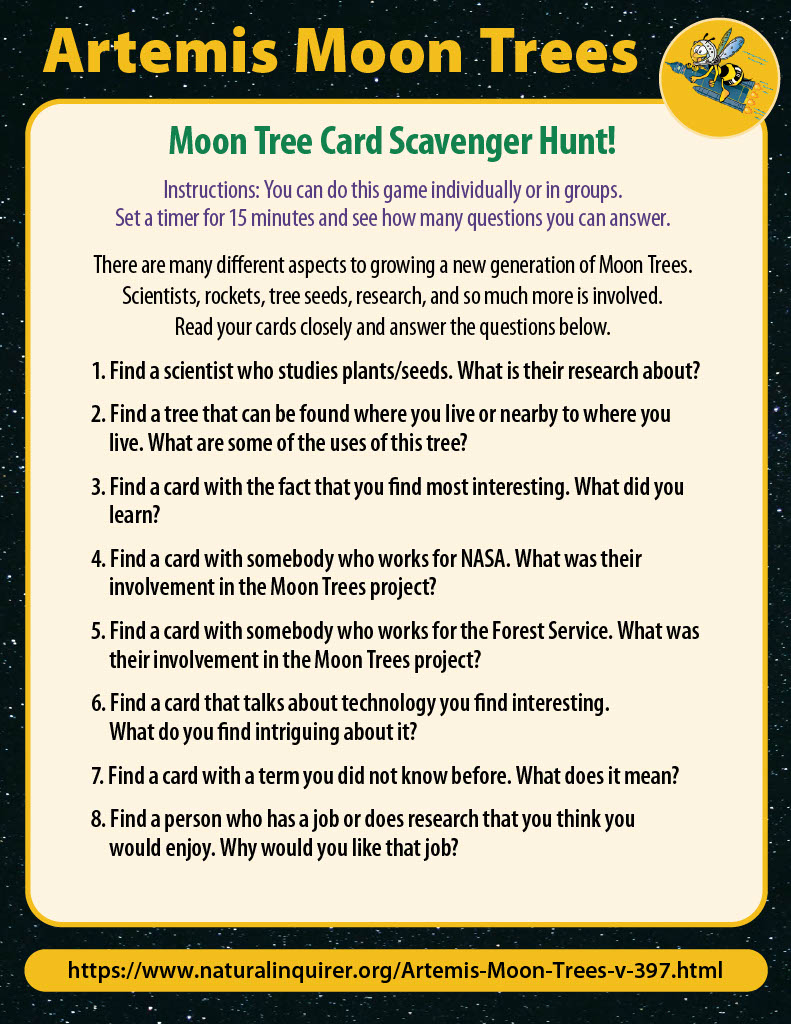Artemis Moon Trees






Cradle of Forestry Moon Tree

- American sycamore (Platanus occidentalis)
- This first-generation Moon Tree can be visited at the Cradle of Forestry, in Pisgah Forest, North Carolina, the birthplace of forestry and forestry education in the United States.
- American sycamore (Platanus occidentalis)
- This first-generation Moon Tree can be visited at the Cradle of Forestry, in Pisgah Forest, North Carolina, the birthplace of forestry and forestry education in the United States.


Tell City Moon Trees

- Sweetgum (Liquidambar styraciflua)
- These first-generation Moon Trees are located in Tell City, Indiana. First-generation Moon Trees were grown from seeds that orbited the Moon on Apollo 14.
- Sweetgum (Liquidambar styraciflua)
- These first-generation Moon Trees are located in Tell City, Indiana. First-generation Moon Trees were grown from seeds that orbited the Moon on Apollo 14.


Forest Capital Museum State Park Moon Tree

- Loblolly pine (Pinus taeda)
- This first-generation Moon Tree can be visited at Forest Capital Museum State Park in Perry, Florida. First-generation Moon Trees were grown from seeds that orbited the Moon on Apollo 14.
- Loblolly pine (Pinus taeda)
- This first-generation Moon Tree can be visited at Forest Capital Museum State Park in Perry, Florida. First-generation Moon Trees were grown from seeds that orbited the Moon on Apollo 14.


Future Artemis Moon Tree

- Giant sequoia (Sequoiadendron giganteum)
- Giant sequoias can be grown in most climates, whereas their cousins, coastal redwoods, are restricted to the foggy coasts of the Western United States. This is why giant sequoia seeds were chosen as one species of Moon Trees for Artemis I.
- Giant sequoia (Sequoiadendron giganteum)
- Giant sequoias can be grown in most climates, whereas their cousins, coastal redwoods, are restricted to the foggy coasts of the Western United States. This is why giant sequoia seeds were chosen as one species of Moon Trees for Artemis I.


Oregon State University Moon Tree

- Douglas-fir (Pseudotsuga menziesii)
- This first-generation Moon Tree is located in Corvallis, Oregon. First-generation Moon Trees were grown from seeds that orbited the Moon on Apollo 14.
- Douglas-fir (Pseudotsuga menziesii)
- This first-generation Moon Tree is located in Corvallis, Oregon. First-generation Moon Trees were grown from seeds that orbited the Moon on Apollo 14.


Friendly Plaza Moon Tree

- Coast redwood (Sequoia sempervirens)
- This first-generation Moon Tree is located at the Friendly Plaza in Monterey, California, and can still be visited today. First-generation Moon Trees are trees grown from the seeds that orbited the Moon on Apollo 14.
- Coast redwood (Sequoia sempervirens)
- This first-generation Moon Tree is located at the Friendly Plaza in Monterey, California, and can still be visited today. First-generation Moon Trees are trees grown from the seeds that orbited the Moon on Apollo 14.


Dave Williams, Planetary Scientist

- NASA
- A planetary scientist studies the planets, moons, and other bodies in our solar system and beyond. They archive data collected by spacecraft missions over the last 70 years, from Sputnik to Artemis, to ensure the data will be available well into the future.
- NASA
- A planetary scientist studies the planets, moons, and other bodies in our solar system and beyond. They archive data collected by spacecraft missions over the last 70 years, from Sputnik to Artemis, to ensure the data will be available well into the future.


Mike Sarafin, Artemis I Mission Manager

- NASA
- I provided oversight and was responsible for critical decisions during the Artemis I mission including conducting polls at key decision points, analyzing risks, and providing direction for the relevant operations team.
- NASA
- I provided oversight and was responsible for critical decisions during the Artemis I mission including conducting polls at key decision points, analyzing risks, and providing direction for the relevant operations team.



